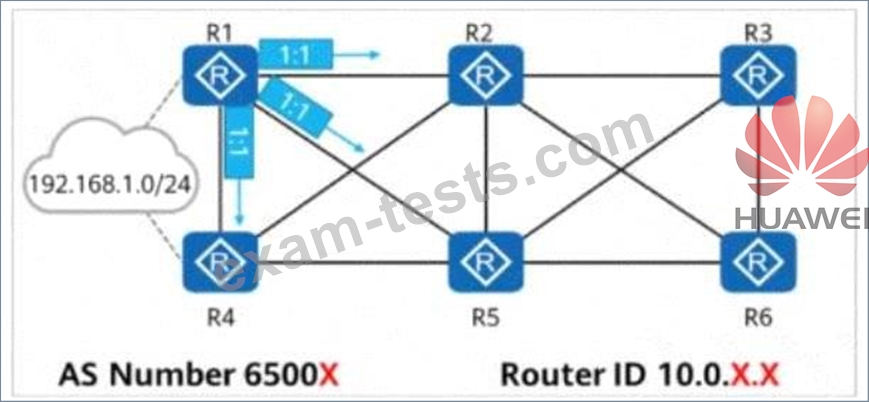Question 86
About the difference between NSR and NSF, which is correct?
Question 87
On the network shown in the figure, EBGP peer relationships are established between neighboring routers through directly connected interfaces.
* The router ID of each router is 10.0.X.X, and the AS number is 6500X, where X is the number of the router.
* Both R1 and R4 have static routes to 192.168.1.0/24, which are imported to BGP through the import-route command.
* R1 adds a community attribute (1:1) to the route before advertising it to its peers.
* All routers are configured to propagate community attributes.
* R3 is configured with a routing policy that rejects routes with the community attribute 1:1.

In this case, which of the following is the path for traffic from R3 to 192.168.1.0/24?
* The router ID of each router is 10.0.X.X, and the AS number is 6500X, where X is the number of the router.
* Both R1 and R4 have static routes to 192.168.1.0/24, which are imported to BGP through the import-route command.
* R1 adds a community attribute (1:1) to the route before advertising it to its peers.
* All routers are configured to propagate community attributes.
* R3 is configured with a routing policy that rejects routes with the community attribute 1:1.

In this case, which of the following is the path for traffic from R3 to 192.168.1.0/24?
Question 88
Large and midsize enterprise networks can be divided into the access layer, aggregation layer, and core layer. Network engineers need to work out a migration solution for the operations to be performed at any layer, as long as the operations affect services on the live network.
Options:
Options:
Question 89
Since BGP is an EGP routing protocol, BGP routing policies can only be deployed between EBGP neighbors.
The routing policy deployed between IBGP neighbors is invalid.
The routing policy deployed between IBGP neighbors is invalid.
Question 90
EGP authentication can prevent illegal routers from establishing neighbors with BCP routers. BCP authentication can be divided into MD5 authentication and Keychain authentication. Which of the following BGP messages will carry BCGP Keychain authentication information? ((Multiple choice)

